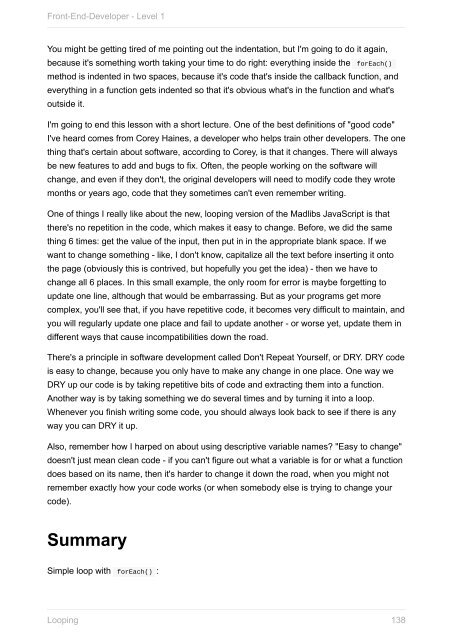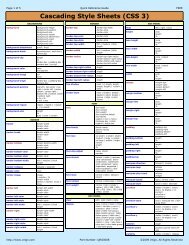front-end-developer_1_
You also want an ePaper? Increase the reach of your titles
YUMPU automatically turns print PDFs into web optimized ePapers that Google loves.
Front-End-Developer - Level 1<br />
You might be getting tired of me pointing out the indentation, but I'm going to do it again,<br />
because it's something worth taking your time to do right: everything inside the forEach()<br />
method is indented in two spaces, because it's code that's inside the callback function, and<br />
everything in a function gets indented so that it's obvious what's in the function and what's<br />
outside it.<br />
I'm going to <strong>end</strong> this lesson with a short lecture. One of the best definitions of "good code"<br />
I've heard comes from Corey Haines, a <strong>developer</strong> who helps train other <strong>developer</strong>s. The one<br />
thing that's certain about software, according to Corey, is that it changes. There will always<br />
be new features to add and bugs to fix. Often, the people working on the software will<br />
change, and even if they don't, the original <strong>developer</strong>s will need to modify code they wrote<br />
months or years ago, code that they sometimes can't even remember writing.<br />
One of things I really like about the new, looping version of the Madlibs JavaScript is that<br />
there's no repetition in the code, which makes it easy to change. Before, we did the same<br />
thing 6 times: get the value of the input, then put in in the appropriate blank space. If we<br />
want to change something - like, I don't know, capitalize all the text before inserting it onto<br />
the page (obviously this is contrived, but hopefully you get the idea) - then we have to<br />
change all 6 places. In this small example, the only room for error is maybe forgetting to<br />
update one line, although that would be embarrassing. But as your programs get more<br />
complex, you'll see that, if you have repetitive code, it becomes very difficult to maintain, and<br />
you will regularly update one place and fail to update another - or worse yet, update them in<br />
different ways that cause incompatibilities down the road.<br />
There's a principle in software development called Don't Repeat Yourself, or DRY. DRY code<br />
is easy to change, because you only have to make any change in one place. One way we<br />
DRY up our code is by taking repetitive bits of code and extracting them into a function.<br />
Another way is by taking something we do several times and by turning it into a loop.<br />
Whenever you finish writing some code, you should always look back to see if there is any<br />
way you can DRY it up.<br />
Also, remember how I harped on about using descriptive variable names? "Easy to change"<br />
doesn't just mean clean code - if you can't figure out what a variable is for or what a function<br />
does based on its name, then it's harder to change it down the road, when you might not<br />
remember exactly how your code works (or when somebody else is trying to change your<br />
code).<br />
Summary<br />
Simple loop with forEach() :<br />
Looping<br />
138










